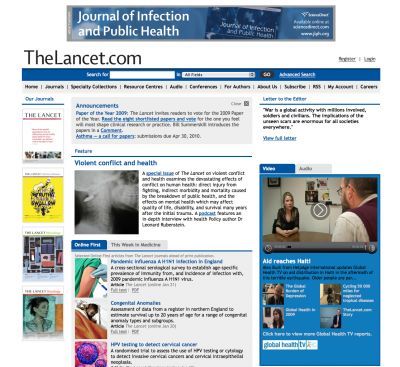Lancet announces "Paper of the Year"

Your support helps us to tell the story
From reproductive rights to climate change to Big Tech, The Independent is on the ground when the story is developing. Whether it's investigating the financials of Elon Musk's pro-Trump PAC or producing our latest documentary, 'The A Word', which shines a light on the American women fighting for reproductive rights, we know how important it is to parse out the facts from the messaging.
At such a critical moment in US history, we need reporters on the ground. Your donation allows us to keep sending journalists to speak to both sides of the story.
The Independent is trusted by Americans across the entire political spectrum. And unlike many other quality news outlets, we choose not to lock Americans out of our reporting and analysis with paywalls. We believe quality journalism should be available to everyone, paid for by those who can afford it.
Your support makes all the difference.The Lancet, the leading medical journal, announced the most voted paper of 2009 on February 20.
The Lancet reported "2009 is the first time that the entire process of nominations and voting for paper of the year has been open to anyone with access to the internet," and "surprisingly, the big health story of 2009, pandemic Influenza A H1N1, was not even nominated."
The voting did elucidate the readership's choice for most interesting study, and based on popularity, the winner is "Prediction of mortality and major cardiac events by exercise echocardiography in patients with normal exercise electrocardiographic testing," published in Journal of the American College of Cardiology.
The Lancet commented, "improving prognostic accuracy for coronary artery disease has wide appeal to clinicians, patients, and those who organise and fund health services."
Alberto Bouzas-Mosquera, lead researcher on the study, pointed out, "the lower sensitivity of exercise electrocardiography for the detection of obstructive coronary artery disease when compared with exercise echocardiography may potentially translate into failure to identify some patients at risk."
This study could impact diagnostic practices of heart disease and is desperately needed since "cardiovascular disease is the leading cause of death worldwide."
Join our commenting forum
Join thought-provoking conversations, follow other Independent readers and see their replies
Comments